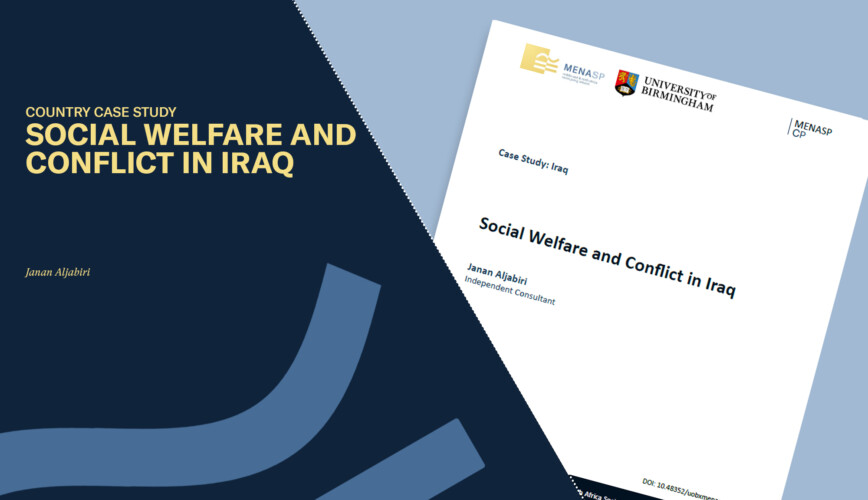Iraq underwent profound changes after implementing consociationalism, power-sharing, and neoliberal policies in 2003. Regrettably, these changes had a detrimental effect on social service provision, employment, and other services. Limited and unjust social services provision has become a shared concern for the population in the central and southern parts of the country, which is the focus of this study.
The rampant spread of corruption has significantly worsened social service provision, a crucial factor contributing to inadequate social services and social welfare: the misuse of state funds and their uneven distribution among political leaders have further increased the population’s needs. This dire situation, particularly the lack of services and unemployment, has sparked widespread protests, especially among the youth who are grappling with persistent unemployment and a shortage of social services such as electricity. The absence of these services has significantly reduced people’s satisfaction, widening the vertical and horizontal inequality gap. This dire situation has eroded the state’s legitimacy and undermined social cohesion, leading to protests and conflicts with far-reaching consequences, which will be discussed in detail in the following sections. The case of Iraq confirms what the literature discusses. When people feel frustrated due to a lack of social services, they seek different means to express their discontent.
The researchers adopted a qualitative approach to unravel the intricate connection between social welfare and conflicts. This research is based on a comprehensive literature review and in-depth interviews with key stakeholders. It explores the intricate connection between the lack of social welfare and the emergence of conflicts and protests. The research draws on 13 in-depth interviews with seven representatives of different ministries in Iraq, five interviews with representatives of civil society organisations, and one civil activist.
This study focuses on how vertical inequality can drive social protest. It pays less attention to horizontal inequalities in Iraq, which have driven armed conflict between sectarian groups. Key findings include:
- Iraq has a set of social protection programmes, yet they need to be stronger and more effective. The lack of available assistance has left the most significant segment of the population, particularly the unemployed youth, without social coverage. The failure to address the population’s needs has many consequences including the emergence of protests in different parts of the country.
- Corruption and the deficit in wealth distribution are the main causes of the state’s failure to provide social welfare and services. This underscores the urgent need for institutional reform to address chronic corruption.
- Patronage politics and the distribution of jobs, benefits, and other services on the basis of nepotism and political affiliations greatly exacerbate the issue of vertical inequality.[1]
- The feeling of alienation is widely spread particularly amongst the youth, who do not feel their lives and dignity have been protected in their country. Demanding to have a state that secures a decent way of life was one of the main slogans of the Tashreen uprising in 2019-2020.
- Widespread protest has been the main strategy used by the population and youth in particular to demand their socio- economic rights. Four popular and mass protests took place during the last decade in addition to hundreds of local protests.
- The use of violence by the state and quasi-state organisations against protesters has damaged state-society relations; on one side, the state neglects the fair demands of the population, accusing them of being politically driven. On the other side, protestors claim that the political elite pursue their own interests and fail to provide economic opportunities.
- Formalising the informal economy is a prerequisite to reducing vertical inequality. Although some existing laws provide security for the people in the private sector, these are poorly implemented.
- Social protection policies play an important role in ensuring that violence and counter violence is not used by both the state and societal forces.
[1] ILO, 2024, ‘Iraq National Strategy’, ILO. Available from: https://www.ilo.org/wcmsp5/groups/public/—arabstates/—ro-beirut/documents/publication/wcms_916523.pdf
DOI: 10.48352/uobxmenasp.0027
Author: Janan Aljabiri, Independent Consultant
This project is supported by the Middle East and North Africa Social Policy Network (MENASP) at the University of Birmingham, in the framework of its ‘strengthening social welfare and security in the MENA region’ research programme, funded by the UK Arts and Humanities Research Council’s Global Challenges Research Fund.
Disclaimer: The opinions expressed in this publication are those of the authors. They do not purport to reflect the opinions or views of the Middle East and North Africa Social Policy (MENASP) Network or the University of Birmingham.
